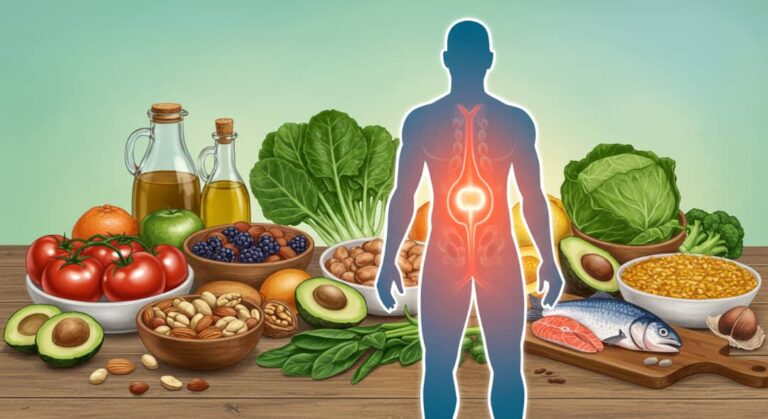The prostate is an essential gland in male health, yet it often receives attention only when problems emerge. As men age, the risk of prostate-related issues increases, making preventative measures a critical focus. Diet, a natural and accessible approach, has proven to play a significant role in maintaining prostate health and reducing the likelihood of complications.
Nutrient-dense foods are not just about fueling the body; they can actively protect against conditions like prostate enlargement and cancer. Studies emphasize the importance of incorporating specific dietary components to support hormonal balance, reduce oxidative stress, and promote cellular health. This article delves into practical, research-backed dietary strategies that equip men with the tools to prioritize their prostate wellness. By embracing the profound link between nutrition and health, men can ensure vitality and longevity, fostering a proactive approach to care that aligns with the demands of modern life.
The prostate, a small gland in the male reproductive system, plays a significant role in maintaining male health. Despite its size, about the size of a walnut, it wields considerable influence over overall well-being. Prostate health issues, such as benign prostatic hyperplasia (BPH) and prostate cancer, are becoming increasingly common, particularly as men age. Prostate cancer is the second most common cancer in men worldwide, with over 1.4 million cases diagnosed annually (Pernar et al., 2018).
Aging is the most significant risk factor for prostate issues, but diet and lifestyle choices also play critical roles. Diets high in processed foods, saturated fats, and red meat have been linked to increased incidences of prostate-related ailments, including prostate cancer. In contrast, diets rich in fruits, vegetables, and certain nutrients, such as lycopene and zinc, can significantly reduce these risks. For example, research highlights that higher intakes of lycopene, found in tomatoes, are associated with a lower risk of advanced prostate cancer (Hoang et al., 2018; Matsushita et al., 2020).
The statistics are clear: one in eight men will be diagnosed with prostate cancer during their lifetime, according to the American Cancer Society. Yet, many of these cases could be prevented or managed with dietary adjustments. A holistic approach that includes mindful eating, regular exercise, and routine screenings can empower men to take control of their prostate health. With the right dietary choices, men can reduce inflammation, support hormonal balance, and ensure the prostate functions optimally.
Understanding prostate health is the first step, but implementing dietary strategies tailored for prevention and wellness is where the real impact lies. This begins with making informed food choices that nourish the body and protect against disease.
Superfoods for Prostate Health
Certain foods have proven benefits for maintaining prostate health, backed by extensive research and clinical studies. These superfoods provide essential nutrients and antioxidants that help combat inflammation, oxidative stress, and hormonal imbalances—all contributors to prostate issues.
One standout nutrient is lycopene, a powerful antioxidant found in tomatoes, watermelon, and pink grapefruit. Lycopene is particularly effective in reducing oxidative damage to prostate cells. Research indicates that diets rich in lycopene significantly lower the risk of prostate cancer by mitigating the activity of carcinogenic pathways and promoting apoptosis in prostate cells (Tjahjodjati et al., 2020).
Cruciferous vegetables like broccoli, kale, and Brussels sprouts are also crucial. These vegetables are rich in sulforaphane, a compound known for its cancer-fighting properties. Regular consumption can lower the risk of prostate enlargement and slow the progression of prostate cancer. A study demonstrated that sulforaphane inhibits tumor growth by triggering apoptosis and disrupting oncogenic signaling pathways, making cruciferous vegetables a potent dietary ally in cancer prevention (Ferreira et al., 2019).
Read also: Guarding Against Prostate Disease: Tips For Men Over 40
Fatty fish such as salmon, mackerel, and sardines provide omega-3 fatty acids, which are essential for reducing inflammation and maintaining hormonal balance. Omega-3s have been shown to inhibit the growth of prostate cancer cells and improve overall prostate health.
Green tea, a staple in many cultures, is another powerful ally. Rich in polyphenols and catechins, green tea has been linked to a reduced risk of prostate cancer. Consuming two to three cups daily can provide a substantial protective effect.
Nuts and seeds, particularly pumpkin seeds, are excellent sources of zinc, a mineral vital for prostate health. Zinc regulates prostate cell growth and reduces inflammation, ensuring the gland functions smoothly. Incorporating a handful of pumpkin seeds into your daily diet can provide a natural, convenient boost to prostate health.
The power of these superfoods lies not just in their individual benefits but in their synergy when combined into a balanced diet. By integrating these nutrient-dense foods into meals, men can proactively safeguard their prostate health.
Building a Prostate-Friendly Diet
Creating a prostate-friendly diet doesn’t have to be complicated or restrictive. The key lies in prioritizing whole, unprocessed foods while minimizing those that contribute to inflammation and poor health outcomes.
Begin by emphasizing plant-based meals. A Mediterranean-style diet, which includes generous portions of fruits, vegetables, whole grains, and healthy fats, has consistently been associated with better prostate health. Research highlights that adherence to a Mediterranean diet is linked to a lower risk of aggressive prostate cancer, with a reduction of up to 34% in higher Gleason score cancers (Castelló et al., 2018). Additionally, the Mediterranean dietary pattern’s anti-inflammatory and antioxidant properties contribute to its protective effects against prostate cancer progression (Sciacca et al., 2023).
Limit processed meats, which are high in saturated fats and carcinogens that can aggravate the prostate. Instead, opt for lean protein sources like chicken, turkey, mutton or goat meat, and plant-based options such as lentils, beans, and tofu. Including fiber-rich foods like oats, quinoa, and barley can also support digestive health and help regulate hormones that influence prostate function.
Hydration is another overlooked aspect of prostate care. Drinking plenty of water flushes toxins from the body and supports urinary health, reducing the risk of infections that can strain the prostate.
Cooking methods matter too. Grilling or frying meats at high temperatures can produce harmful compounds linked to cancer. Steaming, baking, or boiling food helps retain its nutrients while reducing exposure to these toxins.
Supplements can complement a balanced diet but should never replace it. While options like saw palmetto and beta-sitosterol have shown promise in supporting prostate health, consult a healthcare provider before introducing supplements to your regimen.
Lastly, consistency is key. It’s not about occasional healthy meals but building sustainable habits that prioritize nutrient-dense foods over quick fixes. Making gradual changes—like swapping sugary snacks for nuts or replacing soda with green tea—can have a significant cumulative effect.
In conclusion, maintaining prostate health is a lifelong commitment, but one well within reach through mindful dietary choices. By embracing these strategies, men can not only protect their prostate but enhance their overall health and quality of life. Taking control of one’s diet is not just an act of self-care—it’s a proactive step toward a healthier, more vibrant future.
References
Castelló, A., Boldo, E., Amiano, P., Castaño-Vinyals, G., Aragonés, N., Gómez-Acebo, I., … & Pérez-Gómez, B. (2018). Mediterranean dietary pattern is associated with low risk of aggressive prostate cancer: MCC‐Spain study. The Journal of Urology, 199, 430–437. DOI: 10.1016/j.juro.2017.08.087.
Ferreira, P., Rodrigues, L. A. R. L., de Alencar Carnib, L. P., de Lima Sousa, P. V., Lugo, L. M. N., Nunes, N. M. F., Silva, J. do N., Araûjo, L. da S., & Gonçalves Frota, K. de M. (2019). Cruciferous vegetables as antioxidative, chemopreventive, and antineoplastic functional foods: Preclinical and clinical evidence of sulforaphane against prostate cancers. Current Pharmaceutical Design, 24(40), 4779–4793. DOI: 10.2174/1381612825666190116124233.
Hoang, D. V., Pham, N. M., Lee, A. H., Tran, D. N., & Binns, C. (2018). Dietary carotenoid intakes and prostate cancer risk: A case-control study from Vietnam. Nutrients, 10. DOI: 10.3390/nu10010070.
Matsushita, M., Fujita, K., & Nonomura, N. (2020). Influence of diet and nutrition on prostate cancer. International Journal of Molecular Sciences, 21(4). DOI: 10.3390/ijms21041447.
Pernar, C. H., Ebot, E., Wilson, K., & Mucci, L. (2018). The epidemiology of prostate cancer. Cold Spring Harbor Perspectives in Medicine, 8(12). DOI: 10.1101/cshperspect.a030361.
Sciacca, S., Lo Giudice, A., Asmundo, M. G., Cimino, S., Alshatwi, A., Morgia, G., Ferro, M., & Russo, G. I. (2023). Adherence to the Mediterranean diet and prostate cancer severity. Mediterranean Journal of Nutrition and Metabolism. DOI: 10.3233/mnm-230073.
Tjahjodjati, S., Sugandi, S., Umbas, R., & Satari, M. (2020). The protective effect of lycopene on prostate growth inhibitory efficacy by decreasing insulin growth factor-1 in Indonesian human prostate cancer cells. Research and Reports in Urology, 12, 137–143. DOI: 10.2147/RRU.S232745.










